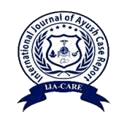Clinical Approach to Subclinical Hypothyroidism through Ayurveda: A Single Case Study
Abstract
Subclinical hypothyroidism is a condition characterized by elevated Thyroid-Stimulating Hormone (TSH) levels while serum thyroxine (T4) remains within the normal range. Most of the time subclinical hypothyroidism is asymptomatic; however, some may exhibit mild symptoms typically of hypothyroidism. According to research, approximately 2–5% of individuals with subclinical hypothyroidism progress to overt hypothyroidism each year. From an Ayurvedic perspective, this condition can be correlated with Rasapradoshaja Vikara, where there is vitiation of Kapha dosha and impairment of Rasavaha srotas, often manifesting as Agnimandya(~Weak digestion), tandra(~Drowsiness), and gourava(~Heaviness). Based on this understanding, a treatment protocol addressing Rasapradoshaja Vikara—including Langhana (~Lightening theraphy), Deepana (~Appetizer)-Pachana (~Carminative), and selective Shodhana—was adopted. The results were found to be positive, with improvements in subjective symptoms as well as in the thyroid function test. A 44-year-old married male patient with complaint of incomplete evacuation of stool about 3-4 times per day with no satisfaction since 6 months. Also patient had complaint of reduced appetite (Ashradda) and sometime Ajeerna. Patient had Ajeerna Ahara Lakshanas like Gouravata also had investigated for thyroid profile T3 (3.06pg/ml). freeT4 (1.24ng/dl), TSH (7.46uIU/ml) and found to be hypothyroidism and pre diabetic with FBS (105mg/dl), PPBS (174mg/dl), HbA1c (5.9%) since last year. But not on any medications. Patient wanted Ayurveda treatment so visited Adicunchanagiri Ayurveda hospital OPD.

